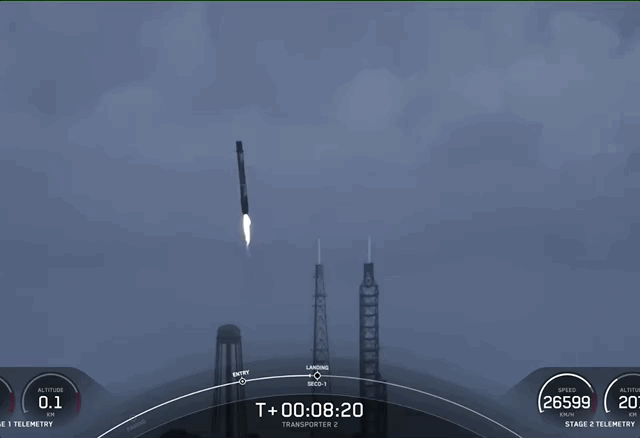SpaceX delivers 88 satellites to orbit, lands first stage onshore for first time in 2021
SpaceX launched 85 satellites for external customers, as well as three Starlink satellites, to orbit on Tuesday, marking the second successful launch of the company’s dedicated rideshare missions. While the Transporter-2 mission will deliver fewer objects to space than the first rideshare mission (the Transporter-1 sent up 143 satellites, a new record), it launched more mass to orbit overall.
The Transporter launches are part of the company’s rideshare business model. Announced in 2019, these missions split up the rocket’s payload capacity amongst multiple customers, resulting in lower costs for each – many of whom are smaller companies that may find the expenses associated with getting to orbit otherwise impossible to pay. SpaceX still ends up with a full launch and the revenue to operate it.
The Falcon 9 rocket took off from Cape Canaveral in Florida at around 2:32 PM. It’s the twentieth Falcon 9 launch in 2021 and the first launch this year that featured the first stage returning to land onshore, rather than on a drone ship at sea. The first stage booster separated at around 2:34 PM and returned to Cape Canaveral and successfully landed around 8 minutes after liftoff. This was its eighth flight.

Image Credits: SpaceX (opens in a new window)
The mission includes nearly ten customers, some of whom are launch service providers who are themselves organizing customer payloads – like Spaceflight Inc., who is launching 36 small satellites on behalf of 14 customers, as well as its electric propulsion vehicle dubbed Sherpa-LTE. It also includes the first satellite launch for space intelligence company Umbra and Loft Orbital’s “rideshare” satellites, YAM-2 and YAM-3, each of which are equipped with 5 independent sensors for separate customers.
As this was SpaceX’s twentieth launch this year (and 127th mission to date), it’s pretty safe to assume that the company will far surpass last year’s record of 26 launches.
This was the second attempt of the Transporter-2 launch, which was originally scheduled for June 29. That launch was halted at T-11 seconds after a rotary aircraft entered the flight zone. SpaceX CEO Elon Musk called the regulatory system broken in response.
Unfortunately, launch is called off for today, as an aircraft entered the “keep out zone”, which is unreasonably gigantic.
There is simply no way that humanity can become a spacefaring civilization without major regulatory reform. The current regulatory system is broken.
— Elon Musk (@elonmusk) June 29, 2021
from TechCrunch https://ift.tt/3x9h2Ac
Comments
Post a Comment